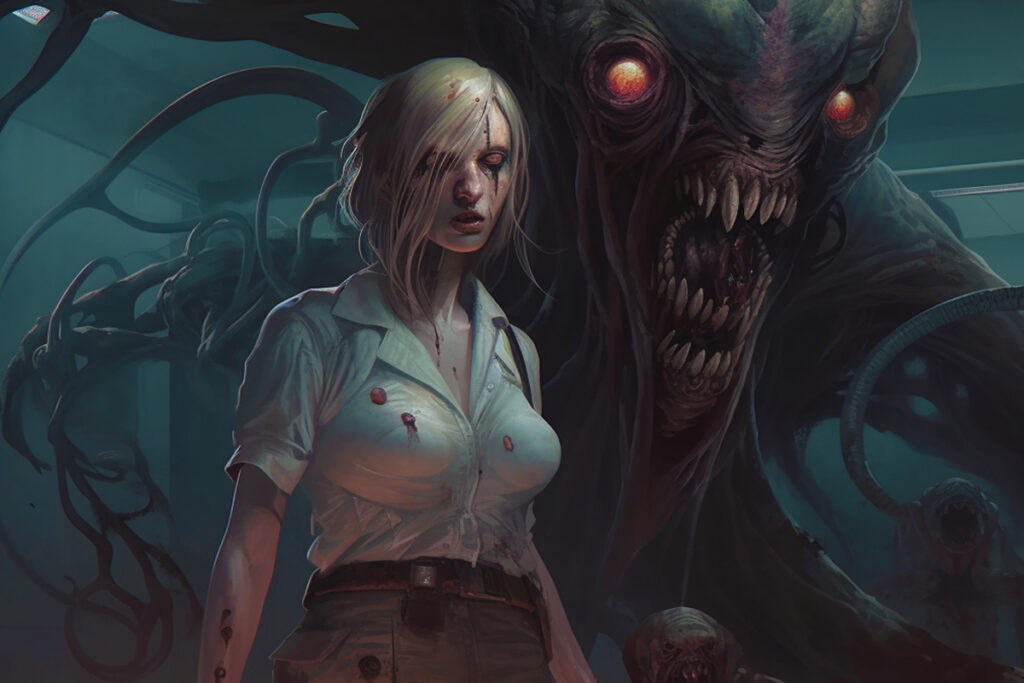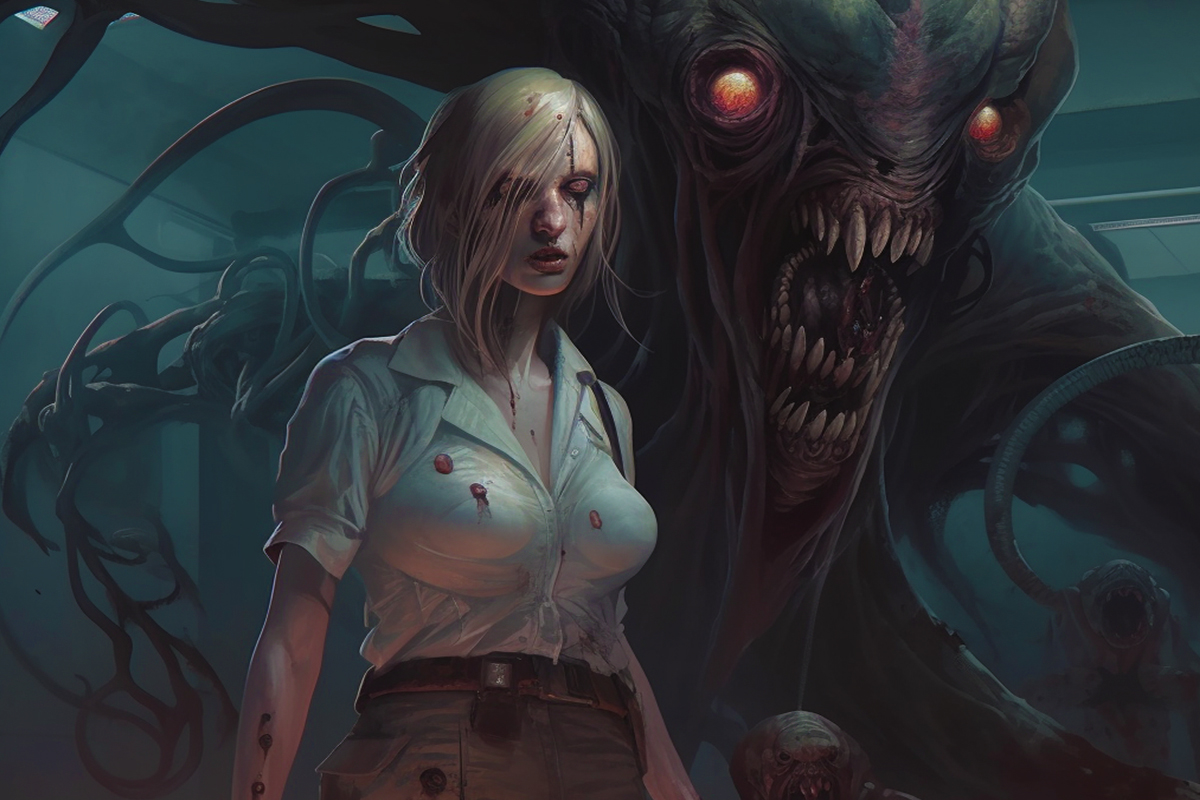There’s something magnetic about the darker aspects of life, something that draws you in despite your misgivings, something that curdles your blood despite your heart racing ever faster, and few writers are capable of distilling such horror on the page.

A highly visceral genre, horror requires authors to exhume twisted thoughts from the deepest tombs of their minds, so not only must they be talented to pen their spine-tingling tales, but brave, too.
Today, I’ll be introducing you to 8 authors who have both virtues in volumes. Below, you’ll find the true savants of the written scare, all of which are fluent in the language of fear. Proceed… if you dare!
8 Best Horror Authors To Scare You, Guaranteed
Fear is much like any other feeling in that we all experience it uniquely — Not everyone finds all things intended to be a laugh, funny, and not everyone finds all things intended to scare, scary, but it’s unanimously agreed that the following authors are the scariest scribes in the biz.
Stephen King
Ax-wielding lunatics, rabies-ridden dogs, and gutter-dwelling killer clowns are just a few of the harrowing characters lurking in Steven King’s deep, deep back catalog, making him the undisputed king of modern horror.
The real magic of King’s work is his ability to seamlessly blend fantastical and real elements, so even when he ramps up the supernatural aspects of his stories, the fear you never feel really becomes abstract.
Stephen King’s most notable horror stories include:
- IT
- The Shining
- Salem’s Lot
- Desperation
- Pet Sematary
- Black House — Co-author alongside Peter Straub
- Cujo
- Carrie
- Bag of Bones
- The Stand
- Misery
- Gerald’s Game
Pros
- Lots to read — If you like King’s style, you’re set for years.
- Plenty of adaptations to enjoy — King has straight-up conquered Hollywood!
Cons
- Not everything he’s written is fantastic — You’re not going to write 80+ books without producing a few stinkers.
Bram Stoker
Thanks to Dracula, his seminal work published in 1897, Stoker has become one of, if not the biggest name in the gothic horror genre.
Presented in a hyperrealistic epistolary format, Bram Stoker’s characterization of the eponymous vampire laid down the framework for every vampiric beast of future fiction.
Unfortunately, Dracula wouldn’t reach the height of its success until long after Stoker was, like his titular villain, resting in his coffin, but that’s not to say it didn’t have a profound impact on the literary landscape during his life.
Sir Arthur Conan Doyle wrote the Irish author after reading the gothic tale, remarking “I think it is the very best story of diablerie which I have read for many years.” Other spooky Stoker titles include:
Pros
- Created the archetypal vampire — Stoker walked so Anne Rice could run.
Cons
- Stoker was an antisemite — Dracula is a horrendously antisemitic book if you read between the lines.
Edgar Allen Poe
If Stoker’s work comes under any criticism (other than antisemitism), it’s that he ripped off Edgar Allen Poe, but when you consider this maudlin American’s contributions to the horror genre, you can hardly blame the Dracula author for pinching a few things here and there.
Poe was a troubled fellow, and it shows in his body of work, each major story suffused with gloom and dread.
Capable of cultivating a sinister atmosphere that seems to rise from the pages of his books and clagg about the reader like smog around a spirit-of-coal streetlamp, he was a wholly unique author. His stories that will get your knees a-knockin’ include:
Pros
- Genre-defining — Poe helped to define the detective genre that would be made famous by Conan Doyle.
- Epic gothic poetry — His poems are almost as spooky as his stories.
Cons
- His stories don’t have the strongest endings — Poe’s codas can be, well… meh.
H.P. Lovecraft
H.P. Lovecraft was such an original writer that he formed his very own horror subgenre… cosmic horror, or, as many choose to call it, Lovecraftian horror.
His signature take on terror focuses on the cold sweat-inducing fear of the unknowable and incomprehensible, giving his work a tinge of science-fiction at times.
As the father of the infamous and terrible Cthulhu, a god-sized dragon-octopus-human amalgam the very sight of which drives people insane, Lovecraft was a shoo-in for this frightful list. His most notable works include:
Pros
- Not your run-of-the-mill horror — Forget ghosts and gore and make way for alien gods and ancient secrets.
- Steven King-approved — King called Lovecraft the greatest horror author of the 20th century.
Cons
- Lovecraft wasn’t a very nice man — Much like Stoker, Lovecraft was a rampant antisemite that disliked “alien cultures”, which is probably why notions of “unknown as evil” permeate his work.
Mary Shelley
Mary Shelley was born a few decades too late to invent the horror genre, but, incidentally, her horror classic Frankenstein: The Modern Prometheus, did wind up being the first ever science fiction story, and get this… she was only 19 when she wrote it.
Although she didn’t subscribe to the horror genre exclusively, The Last Man is another Shelly story that will send shivers down your spine.
Pros
- Shelly was a prodigious writer — Shelly was perhaps the best writer of her generation.
- Created science fiction genre — Frankenstein was the first step on the road to all future sci-fi.
Cons
- Not much horror to read — Shelly dipped into a multitude of different genres in her writing, meaning horror diehards will only get kicks from a couple of her stories.
Dean Koontz
One could argue Dean Koontz is an even more prolific writer than King, and even though his work predominantly inhabits the thriller genre, when he blurs the lines between suspense and out-right horror, let’s just say you won’t want to be reading his books alone at night.
His scariest stories include:
Pros
- You’ll never run out of Koontz stories — With over 100 books bearing his name, there are enough Dean Koontz stories to last a lifetime (to find the best reading order, read here).
Cons
- Not horror through and through — His thriller-leaning style doesn’t always veer into horror.
Clive Barker
You’ve heard of Hellraiser and the Candyman series, right? Well, we have just one writer to thank for both… Clive Barker.
This British author made a name for himself in the horror genre back in the 80s, his Books of Blood shorts even earning some attention from horror legend Steven King who remarked “I have seen the future of horror, and his name is Clive Barker.”
As well as Books of Blood, his notable works include:
Pros
- Rewarding reads — They’re not always easy-going but always, always highly rewarding.
Cons
- Not all horror — Barker’s work often veers into fantasy territory, particularly in his later work.
Shirley Jackson
Author of the quintessential haunted house story, The Haunting of Hill House, Shirley Jackson was snapping necks (in her stories) and cashing checks for her horror writing when Western culture was still a living hell for women.
Not only was the very notion of her celebrity as a writer antithetical to the backwards values that defined the early 1900s, the subject of her work was less sugar and spice and all things nice, and more ghouls and ghosts and all things morose.
Other notable Jackson works include:
Pros
- Feminist icon — Through her writing, Jackson became one of the biggest badass boss ladies of the 1900s.
- Adaptations — The Haunting of Hill House is now a smash hit Netflix series.
Cons
- Violence may be triggering — Our girl Shirl didn’t sugarcoat anything. Some passages in her books can be downright disturbing.
How To Choose The Right Horror Author For Your Next Spooky Read?
Not sure how to start reading the horror genre? No problem; I’ll tell you how to make your first author selection.
Utilize Subgenre
Horror is an incredibly diverse genre, patch worked together with nigh on countless subgenres, each catering to a very specific form of fear.
Doing some research into these microcosms of the genre may give you an idea of what you’d be into as well as guide you to the biggest authors in each subcategory.
Read Excerpts
Even if you come across an author who specializes in a subgenre that sounds intriguing, it might not quite scratch that scary itch.
Read a few excerpts from some of their work to get a feel for their style before buying a book just to make sure it can provide your horror fix.
Think About What You Don’t Want To Read
Sometimes the safest way to choose a horror author or book is to think about what you don’t want to read and do some research for stories that steer clear of these topics. For example, you could Google, “best horror stories without gore”.
Final Thoughts
What draws us to the horror genre?
If anything, we should be doing all we can to escape these spooky stories, but for unknown reasons, we’re compelled to flip page after harrowing page, terrified and thrilled in equal measure, and these 8 authors are the most revered scare masters of all!
Frequently Asked Questions
How Many Subgenres Of Horror Are There?
There are enough literary horror subgenres to keep you entertained for many lifetimes, including:
Apocalyptic
Avant-garde
Body
Camp
Comedy
Cosmic
Dark fantasy
Erotic
Experimental
Folk
Gothic
Non-supernatural
Paranormal
Post-apocalyptic
Psychological
Sci-fi
Splatterpunk
Supernatural
Survival
True crime
And this isn’t even an exhaustive list! Horror is a constantly evolving genre in which there is still plenty to explore.
- Peter James’s Bestselling 19 Roy Grace Books In Order - June 2, 2023
- The 5 Best Novels About Alexander The Great - May 26, 2023
- 38 Amazing Literary Books To Get Lost In - May 26, 2023
